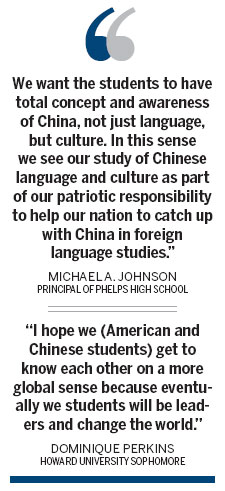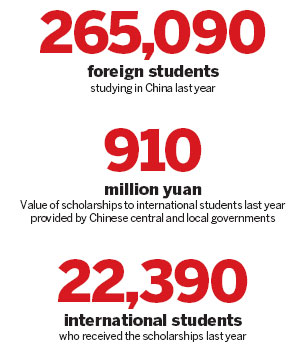'Intermingling cultures'

Even with crowded class schedules, Phelps High requires students not only to take a world language, such as Spanish or Chinese, but also insists that they do so for three or four years, instead of the two years required by the local public school system.
"We want the students to have total concept and awareness of China, not just language, but culture," Johnson said. "In this sense we see our study of Chinese language and culture as part of our patriotic responsibility to help our nation to catch up with China in foreign language studies."
He hopes to prepare his students for careers that require not only their skills as architects and engineers but also their dual language ability.
Gaining knowledge about China and learning the language are not only about the numbers, but also "a national effort designed to increase dramatically the number, and diversify the composition, of American students studying in China," the US State Department release said.
With the initiative, American schools and universities, especially those with more minority students, hope to extend their international reach and increase the students' global perspective.
In meeting with the press, Dr. Sidney A. Ribeau, president of DC-based Howard University, cited a 2008 study showing that among American students in overseas study programs, only 16 percent were minority students. African-Americans accounted for 3.5 percent. The 2009 Open Doors report by the Institute of International Education in the US also indicated that of the 260,327 Americans studying abroad, only 4.2 percent were black.
Howard, a historically black university, is committed to mending the divide, Ribeau said. He wrote in the school's summer magazine that higher education must prepare students to deal with more complexities in the world brought by "the growing intermingling of cultures, and the profound lack of awareness and misunderstandings that characterize many of our relationships".
New perspectives
Andrea Corey, media relations officer in the State Department's Foreign Press Center, said learning Chinese and other foreign languages "changes the way you think and how you see the world".

"We know our students are going to lead and engage the whole world to solve problems with their peers in other countries," said Sally A. Schwartz, director of the nonprofit DC Center for Global Education and Leadership.
By "our students", Schwartz stressed that she was not talking about the children of diplomats, officials or even the US president. She was talking about children "whose parents may not have traveled abroad, studied abroad; may not have gone to college; may never have even thought about going overseas".
Principal Johnson said it is very important that the students "be global learners with a global perspective that will help them to understand how those outside of the US see, interpret and respond to events".
"We are all interconnected with or without our permission. An environmental or economic event in one part of the world can have an immediate and dramatic effect in another part of the world far away from the original event," he said.
That's why his students need to learn "to think in the language. This knowledge of other people and their culture is not extracurricular but rather is essential to our educational objectives and also to the well-being of our nation."
Finding out more
The students understand their missions very well.
Although Sarter, the Phelps High student, is majoring in architecture, she hopes to pursue Chinese language when she goes to college. "When you think of America's future and its connection to China, you start to think collaboration, something positive."
"I want to find out their (Chinese) leadership experiences, their perspectives on the US and what they think (about) how we see things," said Caleb Davis, a member of the Howard University Freshman Leadership Academy who is going on the Beijing trip.
"I hope we (American and Chinese students) get to know each other on a more global sense because eventually we students will be leaders and change the world," Howard's Perkins told China Daily.
